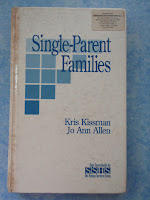Today, I got my second draft research paper from Miss Dzeelfa. Miss Dzeelfa is my supervisor for research paper. My research paper title is “Paul’s Case” by Willa Cather. The reason I choose this research paper is single parent children are common nowadays and some of them face emotional and behavior problems due to the loss of a parent. This issue may not affect all students who are single-parent. As a future teacher, there are surely students who are from single-parent family background and I would like to do this research so that I can understand these people better and I hope the knowledge I gained from this research will be very helpful for my future students.
I have been meeting up with Miss Dzeelfa for research paper discussion such as the outline, first draft and now the second draft. The process of writing the research paper is tough, not easy, but I learned a lot through the process of writing especially have a clearer picture about the story of Paul's Case, Paul's family background, his struggles and coping strategies to overcome his problems.
Before writing this research paper, I read Paul's Case several times and was able to put myself into Paul's shoes. I understand that some children who are from single-parent family do face problems like Paul. As for my situation, I am also from a single-parent family and there are struggles with my own emotion and behaviour as well. In doing this single-parent topic, I will have the opportunity to read up more on children from single-parent family in relation to their emotions and behaviour. The references that i use for this research paper are:
1. Dusek, Jerome B. (1996). Adolescent Development and Behaviour Third Edition. Prentice Hall, Upper Saddle River, New Jersey, 28-29.
2. Kissman, K. & Allen, J.A. (1993). Single-Parent Families. Sage Publications, Inc. 109-123.
3. Vethamani, A.P.D.M.E. EDU 3214 Teaching The Language Of Short Stories, Paul’s Case by Willa Cather, 500-513.
4. McEntire, N. (2003). Children and Grief, http://www.athealth.com/.
5. http://en.wikipedia.org/wiki/Oscar_Wilde
Before I end this blog, I would like to give thanks to Miss Dzeelfa for her guidance, ideas and the patience of reading all my research papers from outline to first draft, second draft and finally final draft. Thank you very much, Miss Dzeelfa. (",)
References:


